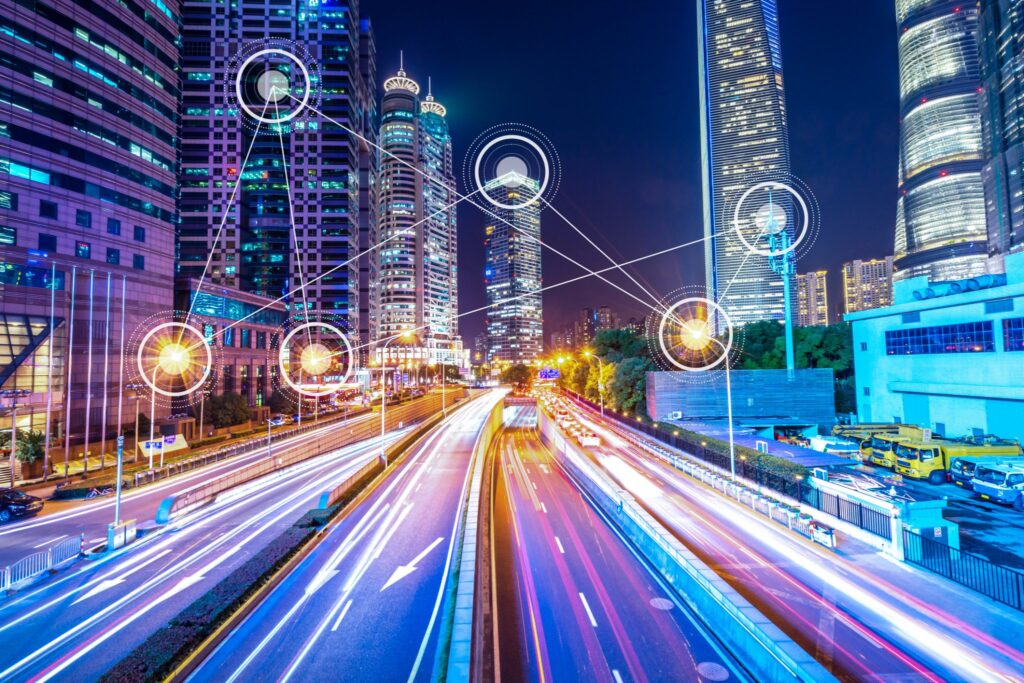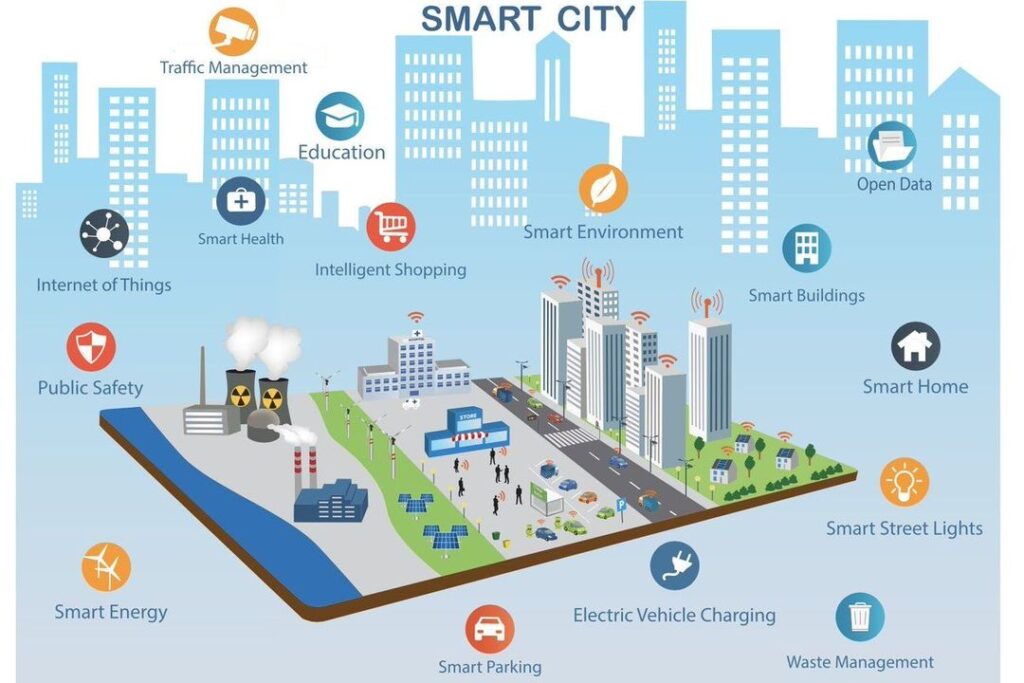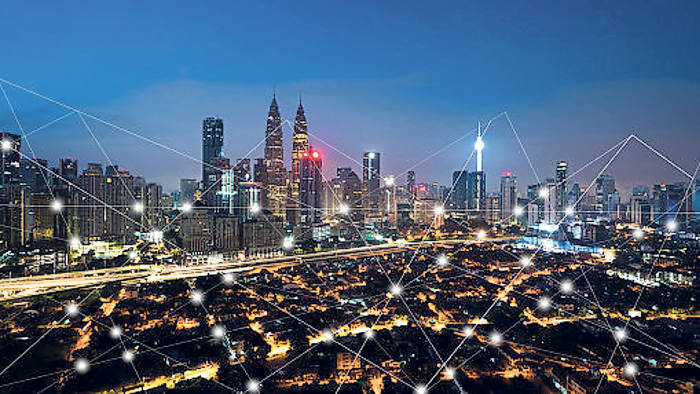The future of smart cities is one that integrates advanced technologies to improve urban living and create more sustainable, efficient, and interconnected communities. This will include the widespread adoption of the Internet of Things (IoT) devices, artificial intelligence, big data analytics, and 5G networks, which will all work together to support smart city initiatives.

Internet of Things (IoT): IoT refers to the interconnected network of physical devices, vehicles, buildings, and other items embedded with sensors, software, and network connectivity. This enables the exchange of data and the creation of new applications and services that can improve city life.
Big Data Analytics: Smart cities generate and collect vast amounts of data from various sources, including sensors, social media, and government databases. Big data analytics allows cities to make sense of this data, identify patterns and trends, and inform decision-making.
Cloud Computing: Cloud computing provides a scalable and flexible platform for cities to manage and store data and run applications. This enables cities to quickly and easily access and analyze large amounts of data, and to make changes as needed.
5G Network Technology: 5G networks offer high-speed connectivity and low latency, making it possible to support the growing number of devices in a smart city. 5G networks are crucial for supporting the real-time exchange of data, enabling new applications and services, and ensuring a seamless experience for city residents.
Cybersecurity: Cybersecurity is essential for protecting sensitive data and ensuring the safety and security of citizens in a smart city. Cities must implement robust cybersecurity measures to protect against cyber threats and ensure the integrity of data and systems.

Smart cities will use these technologies to manage their infrastructure, energy systems, transportation, and public services in a more coordinated and efficient manner. For example, smart cities will have advanced traffic management systems that can reduce congestion and optimize traffic flow, smart lighting systems that can adjust their brightness and energy consumption based on real-time data, and smart waste management systems that can improve recycling and reduce the amount of waste sent to landfills.
Despite the many benefits that smart cities can offer, there are also numerous challenges that must be overcome in order to ensure their success. Some of the main challenges facing smart cities and the solutions that are needed to overcome them.
Data Privacy and Security: One of the biggest challenges of smart cities is ensuring the privacy and security of citizens’ data. With the increasing use of sensors and other connected devices, large amounts of personal data are being generated and stored. This data must be protected from cyberattacks, unauthorized access, and data breaches, which can result in financial losses, identity theft, and other serious consequences. Solutions to this challenge include the use of encryption, secure data storage, and firewalls to protect the city’s data networks.
Integration of Systems: Another challenge of smart cities is integrating the various systems that make up the city’s infrastructure. This includes transportation, energy, water, and other systems that must work together seamlessly in order to provide optimal services. To overcome this challenge, cities must adopt an open-systems approach that allows for the integration of different systems and devices from different manufacturers.
Funding: A major challenge for smart cities is securing the funding needed to implement and maintain their infrastructure. This requires a combination of public and private funding, as well as innovative financing models such as public-private partnerships (PPPs). Governments must also prioritize the allocation of funds to smart city projects in order to ensure their success.
Scalability: As smart cities grow, they must be able to scale their infrastructure to accommodate the increasing demand for services. This requires a flexible and scalable infrastructure that can accommodate new devices, systems, and applications as they are added. It also requires the ability to manage and analyze large amounts of data in real-time, as well as the ability to adapt to changing conditions and requirements.
Cybersecurity Risks: Another major challenge of smart cities is ensuring the security of their infrastructure and devices from cyber threats. This includes protecting the city’s networks and devices from hacking, malware, and other security threats, as well as ensuring the availability and reliability of critical services. Cities must invest in cybersecurity solutions, such as firewalls, antivirus software, and intrusion detection systems, to protect their systems and devices.
Interoperability: A major challenge of smart cities is ensuring that the various systems and devices that make up the city’s infrastructure can work together seamlessly. This requires the development of open standards and protocols that allow for the exchange of data and information between different systems and devices. Cities must also work with manufacturers and suppliers to ensure that their systems are compatible and can communicate with each other.
Citizen Engagement: Smart cities must involve citizens in the planning, implementation, and operation of their infrastructure. This requires the development of platforms and tools that allow citizens to share their opinions and feedback, as well as the ability to collaborate and participate in decision-making processes. Cities must also prioritize the inclusion of marginalized and underserved communities in the development of smart city solutions.
Technical Skills: Another challenge of smart cities is ensuring that the necessary technical skills and expertise are available to support the implementation and operation of their infrastructure. This requires the development of training programs and the hiring of qualified personnel, as well as the adoption of new technologies and solutions that can support the city’s smart city initiatives.
Sustainable Energy: One of the key challenges of smart cities is ensuring that their infrastructure is powered by sustainable energy sources. This requires the adoption of renewable energy technologies, such as solar and wind energy.

In conclusion, the future of smart cities is a promising one that holds the potential to create more sustainable, efficient, and livable communities for everyone. However, it is important for cities to approach the implementation of smart city technologies with caution and consider the ethical, privacy, and security implications of these technologies.
